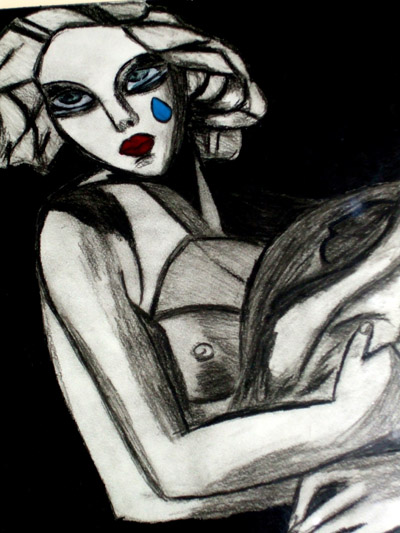Postnatal Depression
She stares down at the little bundle,
Sleeping,
At last,
For once.
Sleeping,
At last,
For once.
The cradle squeaks.
It reminds her of the metallic clunk,
Of two steel rods ripping and pulling.
Afterwards they lay the dripping squealing writhing mass on her abdomen.
She forced a smile,
At the time.
The shame,
The inexplicable guilt,
The lack of love,
An empty cold maternal heart.
She sighed.
Then coughed.
A sea of yellow rain flooded the floor.
It all made sense now,
She was perfect before.
During my primary care placement I was particularly touched by the case of a woman who had developed urinary incontinence shortly after giving birth to her first born. It left her unable to leave the house through fear of embarrassment and dehydrating herself to the point of severe constipation in order to avoid leaking urine. I felt this was a particularly emotive case because the birth of a first child is supposed to be a happy and joyful one. Instead, this lady hid herself away and looked upon this child as a reason for her new found sorrow. The GP was concerned about post-natal depression and mother-child bonding. The piece of art shows a young woman with a darkened bundle in her arms representing the baby. The poem explains the nature of the forceps delivery and her negative feelings.
Whole Person Care, Year Four, 2010

Hi, i’m writing about postnatal depression as part of my final year thesis at university. I was wondering if i would be able to use this picture as a visual representation please? obviously i would reference it back to this web address. Please let me know asap. Thanks
I feel like this picture, along with the poem,is very emotive and truly conveys the difficulties of a woman suffering from post-natal depression.
I do research on perinatal anxiety and trauma and think your painting is a very striking and emotive representation of postnatal trauma. I would really like to use it on our website so please could you let me know if this is OK? I would obviously credit it to you and this website. Thanks.
This piece is very powerful to me, many women go through traumatic births or postnatal struggles that are left unaddressed despite midwifery or GP support due to overworked systems. An experience that is stereotyped as being as the start of this new, incredible, perfect life gives unrealistic societal expectations of complete joy at the birth of a child, but this is not always the case as with this patient who experienced long-term consequences of an instrumental delivery.